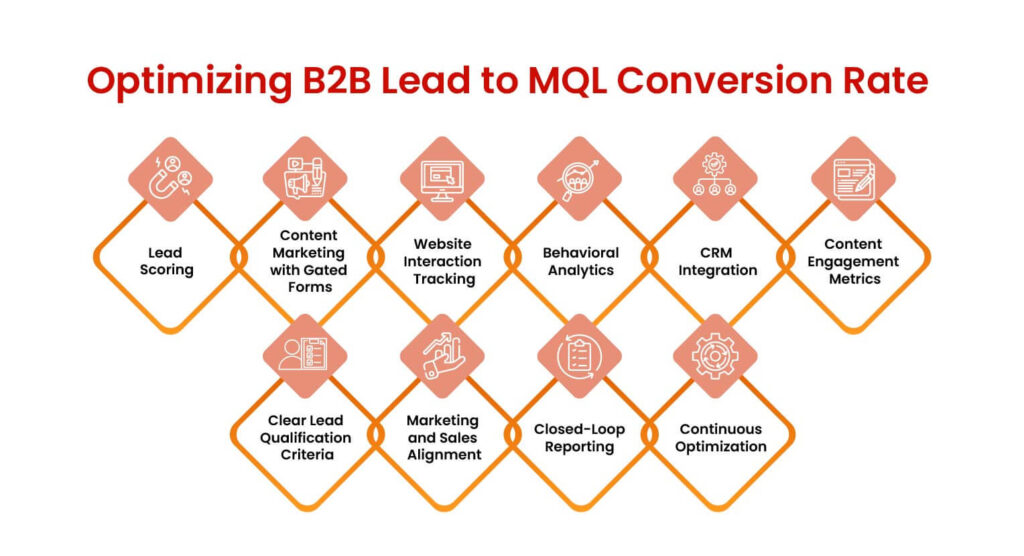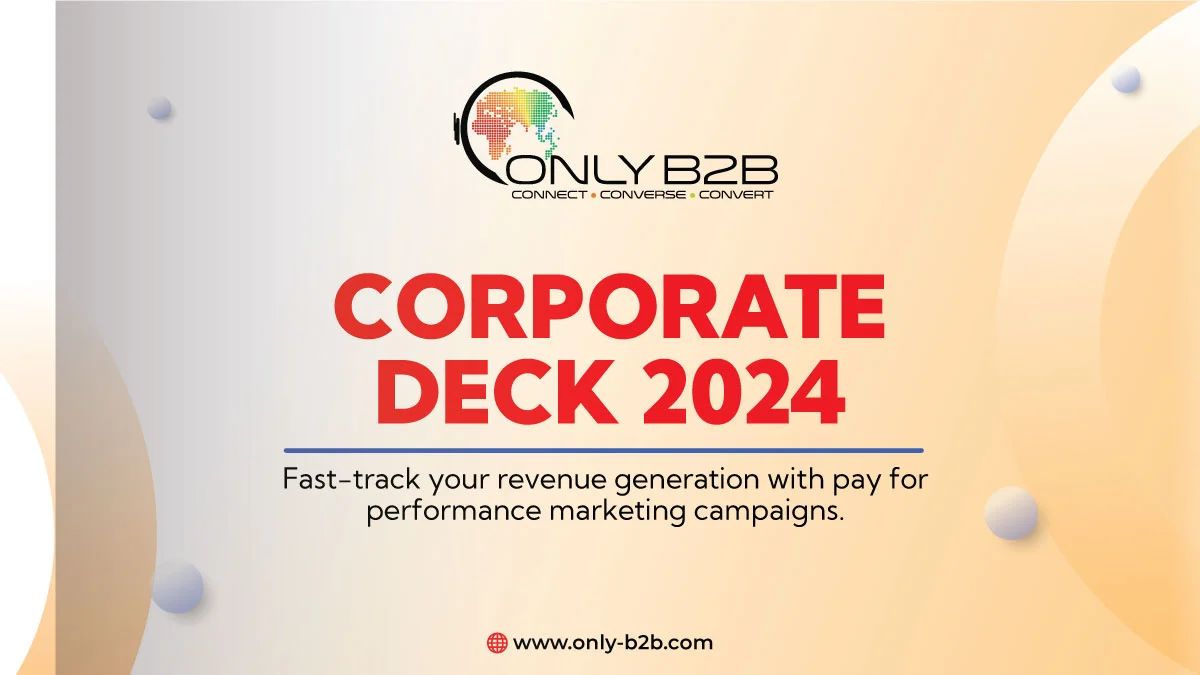
MQL sits at the intersection of marketing and sales. These are leads that have been validated and are ready to be handed over to the sales team. Usually, MQLs are the leads that have shown interest in various ways, like downloading content like ebooks, white paper, signing up for a company newsletter attending a webinar or online event.
Many marketers view MQL as flawed because less than 1% of these leads typically reach the final stage of the buying process, and even then, there’s no guarantee they’ll convert.
But ignoring MQL altogether is a costly mistake. It means missing out on important buying signals, wasting money on generating leads, and ultimately losing out on potential sales.
Let’s delve into the complexities of converting B2B leads into MQLs. In this blog post we’ll explore common pitfalls, industry standards, and effective strategies to overcome MQL challenge.
Must Read: MQL vs. SQL: Which Lead Matters More and When?
Common MQL Challenges in B2B sales funnel
Table of Contents
A B2B sales funnel refers to sequence of stages from top to bottom, guiding leads from awareness to conversion. However, this journey often faces challenges that can hinder MQL conversion. Here are some common hurdles:
Complexity of the Funnel:
According to the CEB report B2B sales often involve on average 7 decision makers and can take anywhere from 6 to 18 months on average. And guiding leads through this complex journey requires a well-defined strategy.
Marketing and Sales Disconnect:
According to Forrester: A well aligned team drives the 15% more revenue.
Misalignment between marketing and sales teams can lead to poorly qualified leads being passed on, impacting conversion rates.
Lead Quality Issues:
Not all leads are created equal. Ensuring you attract leads with a genuine buying intent is crucial for successful conversion. Only about 25% of generated leads qualify as MQLs [source: HubSpot].
Data Measurement and Analysis:
Without proper data tracking and analysis, it’s difficult to pinpoint areas for improvement in your MQL nurturing process.
Adapting to Change:
The B2B landscape is constantly evolving. Keeping pace with marketing trends and technologies is essential for staying ahead of the curve.
Benchmarking Your Success: Where Do You Stand?
Knowing how your B2B leads to MQL conversion rate stacking up against industry benchmarks is vital for setting realistic goals and measuring progress. Here are some key benchmarks to consider:
MQL to SQL Conversion Rate (20-30%): This metric indicates the percentage of MQLs that progress to become Sales Qualified Leads (SQLs) – leads deemed ready for contact by the sales team.
Lead Quality (50-70%): This benchmark reflects the percentage of MQLs that meet your predefined criteria for lead qualification.
Time to Conversion (30-90 days): This measures the average time it takes for an MQL to convert into an SQL or opportunity.
Must Read: Key Differences Between MQL and HQL for B2B Lead Generation
Tactics to Optimize Your MQL Conversion Strategy

“MQLs are the lifeblood of your sales pipeline. But simply generating leads isn’t enough. You need a strategy to convert them into customers.”
– Brent Adamson, author of Millennial Disruption
Let’s explore some proven tactics to optimize your B2B lead to MQL conversion rate:
Lead Scoring:
Implement a lead scoring system that assigns points to leads based on their behavior and demographics. This helps prioritize leads with the highest conversion potential.
Content Marketing with Gated Forms:
Offer valuable content (e-books, white papers) gated behind forms requiring contact information. This allows you to capture leads actively engaged with your content.
Website Interaction Tracking:
Monitor how visitors interact with your website. Pages visited, time spent, and downloads provide valuable insights into lead intent.
Behavioral Analytics:
Analyze user behavior across various channels (social media, email campaigns) to identify leads exhibiting buying signals.
CRM Integration:
Seamless integration between marketing automation platforms and your CRM ensures efficient data sharing and a smooth handoff of MQLs to sales.
Content Engagement Metrics:
Track how leads interact with your content (time spent on page, scroll depth). High engagement indicates a lead might be ready for MQL nurturing.
Clear Lead Qualification Criteria:
Collaborate with sales to define clear criteria for identifying MQLs. This ensures consistency and avoids passing unqualified leads to sales.
Marketing and Sales Alignment:
Foster open communication and collaboration between marketing and sales teams. Regular meetings and shared goals ensure alignment in lead qualification and nurturing.
Closed-Loop Reporting:
Implement reporting systems that track MQLs throughout the entire sales funnel. This allows you to identify areas for improvement and optimize your strategies.
Continuous Optimization:
The key to success is continuous monitoring and analysis. Test different strategies, analyze the data, and refine your MQL nurturing process for ongoing improvement.
Must Read: How to Generate Leads Without Cold Calling?
Personalization: The Key to Unlocking MQL Potential
According to McKinsey research:80% Buyers are likely to purchase from the brands that offer personalized experiences.
By tailoring the MQL nurturing experience marketer can establish the deeper connection with the audience, and increase the chances of engagement and conversion
Tailored Content:
Deliver content relevant to the specific needs and interests of your leads. This could involve segmenting your email list by industry, job title, or previous content downloads. Then, create targeted email campaigns with content that directly addresses their pain points and challenges.
According to Mail Chimp studies personalized emails can improve click-through rates by up to 14% and conversion rates by up to 10%.
Dynamic Email Campaigns:
Segment your email list and create dynamic email campaigns that automatically adjust content based on individual lead behavior. For instance, an email triggered by a website visit to a specific product page could include personalized product information and recommendations.
Account-Based Marketing (ABM):
For high-value accounts, consider implementing ABM tactics. This involves creating highly targeted campaigns specifically designed to engage key decision-makers within those accounts.
Must Read: How to Leverage Account-Based Marketing (ABM) for Marketing Qualified Leads
The Power of Measurement: Tracking Your Success
Optimizing your B2B leads to MQL conversion rate is an ongoing process. To measure your success and identify areas for improvement, track these key metrics:
Conversion Rates:
Monitor the conversion rates of MQLs to SQLs (Sales Qualified Leads), opportunities, and ultimately, customers. This provides a clear picture of the effectiveness of your lead nurturing efforts.
Lead Velocity:
Track the rate at which you generate MQLs over time. Increasing lead velocity indicates a growing and healthy pipeline.
Pipeline Contribution:
Evaluate the contribution of MQLs to your sales pipeline. Measure the percentage of opportunities or deals that originated from MQLs.
Time to Conversion:
Analyze the time it takes for MQLs to convert into opportunities or customers. Shorter conversion times indicate a more efficient sales process
Revenue Attribution:
Attribute revenue generated from customers back to the marketing channels, campaigns, or touchpoints that initially generated the MQLs. This helps you understand which marketing activities are driving the most revenue.
Must Read: How to Generate Leads for B2B Sales?
Conclusion:
By understanding the challenges, leveraging the power of personalization and marketing automation, and consistently measuring your results, you can navigate the complexities of the B2B lead to MQL conversion maze.
mqRemember, successful MQL conversion is an ongoing process that requires continuous optimization and adaptation. By implementing the tactics outlined above, you can nurture your MQLs effectively, improve your sales pipeline quality, and ultimately drive sales growth for your business.

Vikas Bhatt is the Co-Founder of ONLY B2B, a premium B2B lead generation company that specializes in helping businesses achieve their growth objectives through targeted marketing & sales campaigns. With 10+ years of experience in the industry, Vikas has a deep understanding of the challenges faced by businesses today and has developed a unique approach to lead generation that has helped clients across a range of industries around the globe. As a thought leader in the B2B marketing community, ONLY B2B specializes in demand generation, content syndication, database services and more.


